This month we pick up with Labrada talking about his first pro victory at the '86 Night of Champions.
IM: Gaining that kind of momentum can be scary.
LL: There are drawbacks to getting so much so quickly. For one thing, you might become over-confident, which was my personal pitfall. To compete in the 1987 Mr. Olympia, I'd have to requalify. The 1986 Night of the Champions didn't qualify me for the following year. That didn't go over too well with me, but I played by the rules. I entered the '87 Pro World Championships in Essen, Germany, and ended up being defeated by Ron Love. That taught me an invaluable lesson: On any given day other competitors are good enough to win. The only way I could beat them was by having supreme conditioning. Being the slightest bit off could give up an advantage. These guys were 40 to 50 pounds heavier than I was, and I had to come in razor sharp.
IM: Your game plan?
LL: Everything that went into my mouth, I weighed. I kept a food log, which I could then follow like a recipe. Anytime I wanted to get in shape, I'd consult the log and use it to connect the dots. Another thing I learned was to never alter more than one or two variables in my contest approach from year to year.
IM: Now we're up to May 1987, another Labrada milestone.
LL: That was the year of my first Mr. Olympia. I wanted to come in ripped, and whenever I decide on something, I go all out.
IM: That contest was held in G'teborg, Sweden, and it pretty much launched you.
LL: What an exceptional show! Beautifully done, beautifully promoted. More than 5,000 people attended. Seeing it as a competitor gave me an entirely new, more appreciative perspective. I took third, behind [Rich] Gaspari and Lee Haney. Not too bad for my first Olympia! I'd edged out Mike Christian, a pretty big name at the time. My folks and family were thousands of miles away in Texas, but they watched me on closed-circuit TV.
With a third-place finish I had the attention of the bodybuilding world. But not all of it was positive. Critics said I'd placed due to my smaller size, that it was a fluke. Well, I didn't care. In my heart of hearts, I knew I'd one day surpass everyone up on that stage. Lee Haney would be the only one to give me serious competition in the years to come.
IM: Were you still calling Houston home, or had you already packed up for the West Coast?
LL: We lived in Houston, but Robin and I soon relocated to Los Angeles. It was good for my bodybuilding career. I got to meet a who's who of bodybuilding in California'guys like Franco Columbu, Frank Zane, Lou Ferrigno, Arnold Schwarzenegger'all of the stars'right up through to my contemporaries. I also spent a lot of time with Joe Weider. [Muscle & Fitness editor Tom] Deters came out with me and went to work for Joe, first as a writer.
IM: You also had a new training partner.
LL: Right'Craig DeSerf. Craig's one of those guys who possess tremendous drive and willpower, and he pushed me relentlessly. We both had the same kind of build; we were like the gym's dynamic duo. I was very close to Craig during those important years. The pain and suffering and tears we shared in our torture sessions forged an everlasting bond.
IM: You'd supplanted Rich Gaspari in the magazines as bodybuilding's white hope. How did it feel to be man of the moment?
LL: I stayed centered throughout because of the way I was raised and the fact that I was surrounded by good people, including a loving and supportive wife. I've never taken for granted the blessings God has given me.
IM: Did you always enjoy that ride?
LL: To success? No, not always. I didn't take enough quality time to relish my victories. Bodybuilding makes you self-centered, as if the world revolves around you. Don't get sucked in by that!
IM: So now it's 1988'
LL: And the pressure was on! People were watching to see if I could keep up my momentum from '87. I buckled down, started dieting for the Olympia and went overboard. Whenever I prepare for a contest, I cut my calories down to 2,000 a day. In '88 I wanted to get extra lean and mistakenly cut my daily calories to 800. Ha! I got lean all right, but I also lost muscle mass, which I could ill afford to lose.
I guest posed at the Emerald Cup in Seattle, and as I was walking through an underground garage, I blacked out. Robin caught me. My body was telling me to increase those calories! By the Olympia I'd recovered, but I wasn't quite filled out. I did the most tremendous posing routine, which brought down the house, but I only placed fourth.
IM: You also ran the Grand Prix gauntlet in 1988'a hectic schedule.
LL: There were seven stops on the tour, and I was already in contest shape and wanted to compete. At the first grand prix, I placed in the top five. At the second I did better, but the show in Greece was amazing! I'd filled out and reached my peak. That morning I woke up and thought: I'm going to be a Greek statue, I'm gonna come in rock hard. So I ran up and down the stairwell in my hotel, where it had to be at least 90 degrees, just to sweat out the last bit of water.
IM: It boiled down to you and Rich Gaspari'a battle for muscle superiority.
LL: Rich is an excellent, dedicated athlete. I have immense respect for him. He's taken his God-given genetics and multiplied them to the nth degree. Rich set the standard for hardness; he was a formidable opponent. If I beat him, I could face anything, even Haney and the Olympia.
First of all, the auditorium looked like an old Greek amphitheater, a real throwback in time, and it wasn't air-conditioned. With all those hot lights, pools of sweat had gathered under every contestant. As we went through our rounds, I became harder and harder, hitting my peak. Then Rich was announced in second place. Man, I just let out this shout and sailed about five feet in the air, punching as I went! It was a heartfelt victory for me.
IM: And a turning point. The rise of one athlete, the descent of another.
LL: Bodybuilding's a lot like boxing. There are months and months of training leading up to one single day when you're finally judged. Winners can change; you'll see people flip-flopping. As for Rich, he's no slouch, and to snatch victory from him is like stealing a bone from a hungry bulldog. Our rivalry always stayed sportsmanlike'tinged with a healthy mutual respect'but he wasn't about to let me sweep the whole tour. Rich won four, and I won three. It was really a neck-and-neck kind of grand prix tour. Immediately afterward I began thinking about 1989.
ALLIM: With the number-two man weakening, you were moving up. Haney must've been wary.
LL: A formidable opponent. Not only did Lee have the mass, but he could move fluidly, gracefully, and he possessed stage presence, good conditioning and a supremely symmetrical build. He was the first of the massive bodybuilders, the guy who started this trend toward monster physiques. I had my work cut out for me'don't let anyone tell you otherwise. I trained all year with the intention of being in my very best shape ever.
During the evening show a few competitors and I were talking backstage, just lounging around, waiting for the signal to warm up, and Haney looked at me. 'I'm keeping my eyes on you, boy,' he said. When my warmups came off, everybody just stared. They were rushing over and saying, 'Dude, you got a shot. This is your time.' It ended up between Haney and me; he edged me out by three or four points.
IM: There's something to be said for the power of a reigning Mr. Olympia, especially a multiple title winner like Haney. Rarely are they deposed.
LL: That's a fallacy. Anybody can be beaten. This sport is subjective. An incumbent has a natural edge, yes; he's already Mr. Olympia. A person's reputation precedes him, but that can be said of any top gun. It doesn't mean he can't be taken down.
IM: Should reputation and legacy affect judging?
LL: If there's a lot of buzz, it can have an influence. That's not to say judges don't try their darndest to remain impartial and unbiased. And they do a good job at it. The ones who placed me second could've easily placed me 10th. You can't complain much about judging. At the Olympia level they're highly qualified individuals who've been tested again and again.
IM: After the '89 Olympia you hit the grand prix circuit again.
LL: I'd intended on doing that, despite the stress involved. I won three grand prix shows, and the last was in Helsinki. It ended at 10:30 p.m. I'd promised some photographers to pose for photos, no matter how late. At midnight we were at the gym; it was cold, in the middle of winter. I could see my breath, and I was beginning a photo shoot! Discomfort didn't matter. What mattered was fulfilling responsibilities. I maintained that intensity and dedication throughout my bodybuilding career.
IM: Besides earning income as a pro, you raked in good bucks from endorsements.
LL: Yes, I did'and I also became involved in other endeavors, too, like owning a Gold's Gym in San Antonio, Texas. I supervised all the operations via long distance. I got into home building, and at one point I had the largest personal-training company in Houston, with more than 40 trainers. You could say I was spreading myself thin, but I wanted to take full advantage of every opportunity.
IM: The '90 Olympia was drug-tested, and everyone seemed, well, duller, for want of a better term'Haney included.
LL: A drug-tested Olympia was right up my alley, since I didn't depend heavily on anabolics and other enhancers. Drug testing would give me a tremendous advantage, and I meticulously planned my training and diet. When the Olympia rolled around, I showed up, they tested for drugs, and a few competitors were eliminated. I passed my test, as did Haney. I was backstage, and as soon as Haney took off his warmup suit, I thought, 'Labrada, you've won this title.'
Lee Haney's a superb athlete, but he'd missed his peak that night. He had loose skin and was noticeably smaller. I went in for the kill. We did the prejudging, and I found out I was ahead by several points. Boyer Coe came up and congratulated me, and everybody I saw backstage said I couldn't lose.
IM: Did you believe it?
LL: Of course! I was pumped! It all reached a head during the posedown. I jockeyed myself right next to Haney, he glanced at me, and for the first time I saw real concern in his eyes. I said, 'Let's go, big boy,' and started hitting my best shots. When the announcements were read, they stretched out runner-up. 'Leeeeeee',' and it turned out to be me! Somehow, Haney had closed the gap between us. I felt like the entire auditorium was collapsing on me. Disappointment showed on my face, and I didn't even bother to hide it.
That night I went to my hotel, with an entire entourage around me. We were supposed to have a victory party, but all it did was accentuate my placing. 'We're gonna be fine,' I said. Still, the experience threw me into a period of deep introspection.
IM: What conclusions did you reach?
LL: First of all, I questioned why I'd gone into bodybuilding. Was it to win, with no other rewards? Taking second was like running into a brick wall at 150 miles an hour. It made me realize I'd been too focused on the external. Sometimes, stepping back is a necessary process in a person's life. Winning the Olympia just wasn't meant to be, and I had to face reality.
IM: Now that several years have elapsed, does the memory conjure up any hurt feelings?
LL: Not anymore. If I'd won the Mr. Olympia, what would've happened? Maybe I'd only be a footnote in history. The loss made me realize I wasn't smelling the roses. I should've been thinking about making improvements in my physique from year to year, instead of constantly planning the next competition. It's all about competing with yourself, making yourself the best you can be.
I never lost my ambition; I redirected it. I just wanted to enjoy myself, to enjoy bodybuilding as a beautiful, fun pastime. I didn't want to burn out. From 1990 onward I appreciated the good things that bodybuilding had to offer.
IM: I think 1991 was a transitional year for competitive bodybuilding. Dorian Yates stormed the Olympia, and a brand-new era dawned.
LL: Our sport was rapidly changing. Dorian emerged out of nowhere, and I got pushed down to fourth place. I remember that night for something more significant, at least to me: Robin and I conceived our first son. Nine months later we were blessed with Hunter, an event much more important to us than any contest or victory. What a joy!
IM: Another interesting thing happened to you in 1991'the World Bodybuilding Federation.
LL: Vince McMahon was mining the IFBB and dangling mucho cash in front of a lot of faces. They offered me a quarter of a million dollars to join their ranks, but I turned them down. I wanted to stay involved with Joe and Ben. They're the founding fathers of competitive bodybuilding as we know it. I felt a sense of loyalty to the IFBB. I was making a good living, touring, performing exhibitions and conducting seminars and saw no compelling reason to switch. The Weiders offered security. In the end my gut feelings were validated.
IM: But your Weider contract didn't last long either.
LL: No, it didn't. In 1991 Stoney Grimes told me about Bill Phillips, who was publishing a newsletter out of Golden, Colorado. Bill had this nutritional product called Met-Rx. A few weeks afterward I found myself in the Denver airport and decided to give Bill a call. We met, and he told me all about Met-Rx. He wanted me to be involved in promotion. My Weider contract was rock solid, but I promised to keep him in mind.
That same year I sat down with Joe at his house to discuss our contract. The WBF had collapsed by then, and there wasn't much incentive for him to pay contracted athletes exorbitant salaries.
The total compensation he offered was only 60 percent of what it had been previously. I told him I was loyal and wanted to stay, but I'd been offered an excellent deal from Met-Rx. Joe blessed me and said, 'Lee, do what's right for you.'
I signed with Bill, and the deal was lucrative. Met-Rx had no legitimacy yet, and with me they could penetrate the bodybuilding market. It turned out to be a win-win situation, an incredible project, way ahead of its time. The whole Met-Rx thing exploded.
IM: How do you feel about Joe today?
LL: I'm appreciative of all the opportunities he gave me. We still have a very positive relationship, but it was just time for us to part, where business was concerned. Sometimes that happens even in the best of relationships.
IM: Your competitive plate was full during that period.
LL: In 1992 I planned to compete in the Helsinki Olympia and packed on another five pounds of muscle. My attitude was much more relaxed; I came in bigger and harder and landed in third place. People told me I should've been second or even first, but the cards simply weren't on my side.
IM: That momentum swept you to a win at the Pro World Cup.
LL: Which was held a week later in Seville, Spain. I planned to set the record straight. Yates didn't compete in the cup, but Kevin Levrone'who'd been second at the Olympia'did. I went into seclusion, worked like a demon and hit my peak.
IM: Spain'the mother country!
LL: What was really cool was that I had Robin, Hunter, my Uncle Chuck and my mother and father with me. All of my relatives hailed from there, and even though I'm Cuban, I encountered a tremendous groundswell of fan support in Spain. Instant pandemonium every time I was called out onstage. I'd raise my hand, and they'd go quiet. An amazing evening.
IM: And to top everything off, you won. Ah, sweet revenge!
LL: [Grins] The next thing I knew, I was standing next to this huge cup, surrounded by IFBB officials, and Robin and Hunter were running up to congratulate me. I held Hunter over my head, and the crowd whooped. It was one of those magical moments. I can define this as the high point of my bodybuilding career. Thinking about it still gives me goose bumps.
IM: The year 1993 was a watershed in your bodybuilding career.
LL: I decided, for the first time, to break my six-year habit of competing in the Mr. Olympia and other contests in the fall. Instead, I'd compete in the spring'first at the Ironman Invitational, and then at the Arnold Classic. There was a new guy on the circuit, a contender named Flex Wheeler. Going into the IRONMAN, it would be Wheeler and me, neck and neck. And I can honestly say I had the most fun of my career competing against him. My mental state was relaxed. It's what you might call being in a state of bodybuilding enlightenment.
I mixed it up with Flex. He was the rookie, and we had the audience goin' crazy'hitting poses just for fun, laughing and living the moment. It was refreshing. That's where the up-and-coming generation met the outgoing generation. Flex won the IRONMAN, and a few weeks later we went into the Arnold Classic, and he beat me there too, but it was close!
IM: Could you feel a kind of indefinable shifting?
LL: I could feel it, yeah. I'd had a wonderful run, but my time was drawing to a close.
IM: Not coincidentally, the '93 Olympia was also your last.
LL: I competed in my seventh consecutive Olympia in '93, and once again I placed in the top four. I showed up in Atlanta and took a good look around. Lee Haney, who wasn't competing, and I were talking backstage, and I said, 'Lee, you're gone. Rich [Gaspari] is gone. Mike Christian and Berry [DeMey] are gone,' and he smiled at me and said, 'You're the last of the Mohicans.'
The sport was outgrowing me, and I was outgrowing the sport. I started feeling physically burnt out. Being a professional bodybuilder is like driving a race car in second gear. Sooner or later something's gonna explode. I had been relatively injury free over the years, so I could push myself to the red line. After a while you begin thinking, How long can this go on? That's why in 1994 I didn't train for six months and just relaxed, became a relatively normal person. I lost weight but not much. I still weigh 185 pounds, and my competition weight was around 195. I found time to enjoy my life, my family, gather my thoughts and work on my business.
IM: You'd established Labrada Nutrition by then.
LL: There was just too much in-fighting with Met-Rx. We agreed to disagree, and Met-Rx founder Dr. [Scott] Connelly went on with Met-Rx. Bill Phillips went on to Muscle Media, and in early '95 I launched Labrada Nutrition.
IM: But you weren't done with competition yet. There was still the Arnold Classic.
LL: I didn't realize it at the time, but that contest would turn out to be my swan song. I was 35 years old, and things had started to feel different. Know what I mean? I wasn't recovering as fast. I was bigger and stronger, but I'd noticed these subtle changes. The recovery process took longer; I was winded more than usual. Father Time had caught up with me.
IM: Heck, Lee, maybe you were really catching your second wind.
LL: I'm not saying you can't compete beyond 35; it just felt different for me. At the Arnold I was bigger than ever'maybe not as sharp'and I ended up in a disappointing fifth place. That's the only time I ever walked away with less than fourth in a pro contest. The judges were confirming a message my body had already sent me.
IM: What kinds of things were going through your mind?
LL: I went back to the hotel that night with my family. Our room overlooked the river. Robin and Hunter were asleep. As usual I was wired. I sat on the couch and watched the river and city lights, feeling very stoic'and strangely elated.
I'd already prepared myself mentally and emotionally to close those doors and felt such gratitude for the privilege of having experienced my bodybuilding career. But it was time to move forward.
IM: Regrets?
LL: None. I have very, very fond memories of competitive bodybuilding. I miss it, but I don't want to climb the mountain again. What's done is done. After the Arnold I flew to California and did as many photo shoots as I could. A great session with Robert Reiff of Muscle & Fitness and Flex was my last. He took black-and-white shots, classic poses, very moody, and I realized, This is it. When you realize something like that, you can live a lifetime in only a few minutes. I was at my peak condition, this was my last photo shoot, and I had a whole new road in front of me.
In 1996 Labrada Nutrition introduced the Lean Body meal replacement powders, and we quickly carved a niche for ourselves in the nutrition market. People were turning on to our products; they trusted and had followed me throughout my bodybuilding career. They knew I'd been a competitor myself. As such, my products would be properly designed and nutritious and personally guaranteed. It was a recipe for success.
From '95 onward it's been about teaching others what I've learned. I'd been blessed with an opportunity to do a tremendous thing. I wanted to share with other people, and that gave me the perfect vehicle.
IM: Your customer base is certainly a diversified lot'and extensive.
LL: Right now I've got more than 50,000 people who receive weekly e-mail from me on motivation, training and nutrition. I share 25-plus years of experience with them and provide that service for free. I do it through my Lean Body Coach Web site. The life changes, the stories I hear from people who've used our stuff and my training methods, are simply amazing.
IM: Besides being an able spokesperson, what role do you play in the biz?
LL: I actively manage it as CEO and president. In the past bodybuilders were relegated to being poster boys, but I run my own company on a day-to-day basis. It allows me to be hands-on, to stay involved, to help others.
Labrada Nutrition was named number 25 on the list of Houston's 100 fastest-growing businesses. And last year we became an Inc. 500 company! Growth is a great opportunity for me to touch other's lives.
IM: You've also enlarged your family.
LL: Robin and I have added two more sons to our brood, Blade and Pierce. Today my life revolves around God, family and business'and all of it is extremely fulfilling.
IM: Do you have a personal definition of success?
LL: One of the defining traits of true success is the ability to take bad circumstances and extract good from them. That's a beautiful, rare quality and a hallmark for every successful person. You're always going to have challenges in life, but what you glean from those challenges determines the outcome. People who externalize tend to blame others for their position. Those who internalize and accept responsibility are those who achieve happiness and success. Once you realize you're in control'and no one else is'you can do it. You can control almost anything.
IM: You're an immigrant who found the American Dream. What are your thoughts on the USA? Especially during these trying times?
LL: I love this country. She opened her arms to me. And I don't let my sons forget that. People take America for granted. If you'd traveled as much as I have and seen Third World countries, you'd appreciate how blessed we are here in the U.S.
IM: September 11, 2001, galvanized us as a nation. Suddenly our differences were gone, and we banded together for the common good.
LL: The events of 9/11 were terrible, but the reaction to them has been an example of resiliency. I'm so proud of how we've come together as a people. Now we should focus on the positive without diminishing any of the horrible tragedies. Let's not lose this great feeling of being together.
IM: We can't leave without your words of advice for the legion of young bodybuilders reading this.
LL: Really, the best advice I can give to any bodybuilder is this: Enjoy the path; enjoy the process. Titles are nice, but bodybuilding'in and of itself'is what makes a great champion. Challenge your body. Conquer your body. You can do it. Lee Labrada's Competitive Record
'82 NPC Texas Collegiate Championships, 1st
'82 NPC Junior Gulf Coast Championships, 1st
'83 NPC Texas Championships, 1st Middleweight and Overall
'84 NPC USA Bodybuilding Championships, 2nd Light Heavyweight
'84 NPC Nationals, 5th Middleweight
'85 NPC Nationals, 1st Middleweight
'85 IFBB World Amateur Championships, 1st Middleweight
'86 IFBB Night of Champions, 1st
'87 IFBB World Professional Championships, 2nd
'87 Mr. Olympia, 3rd
'88 Mr. Olympia, 4th
'88 Greek Grand Prix, 1st
'88 British Grand Prix, 1st
'88 Spanish Grand Prix, 1st
'89 Mr. Olympia, 2nd
'89 British Grand Prix, 1st
'89 Dutch Grand Prix, 1st
'89 Finnish Grand Prix, 1st
'90 Mr. Olympia, 2nd
'91 Mr. Olympia, 4th
'92 Mr. Olympia, 3rd
'92 Pro World Cup, 1st
'93 IRONMAN Pro Invitational, 2nd
'93 Arnold Schwarzenegger Classic, 2nd
'93 Mr. Olympia, 4th
Editor's note: Learn all of Lee Labrada's insider secrets of training and nutrition by signing up for his free weekly e-newsletter at www.leanbodycoach.com. IM












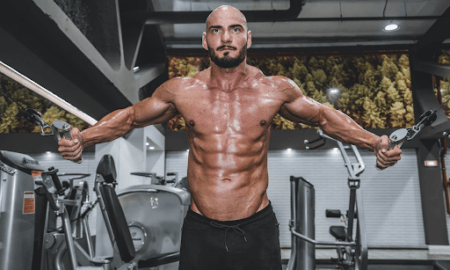
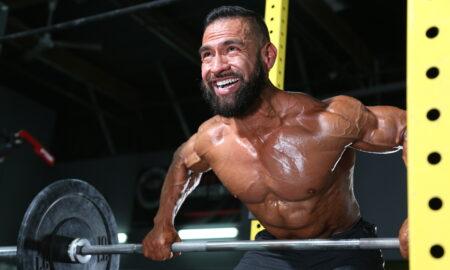
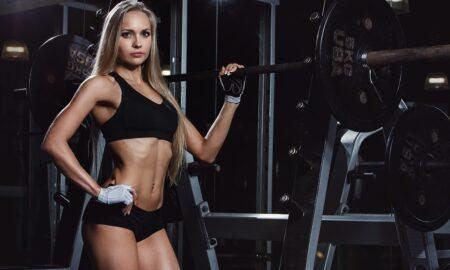
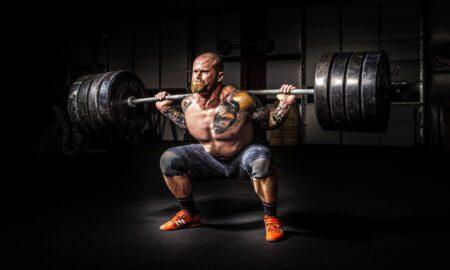
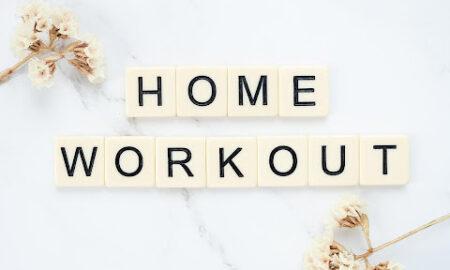

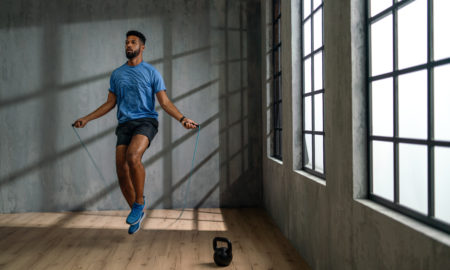
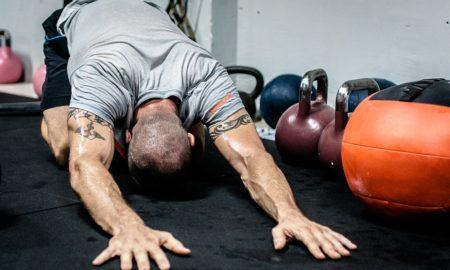
You must be logged in to post a comment Login